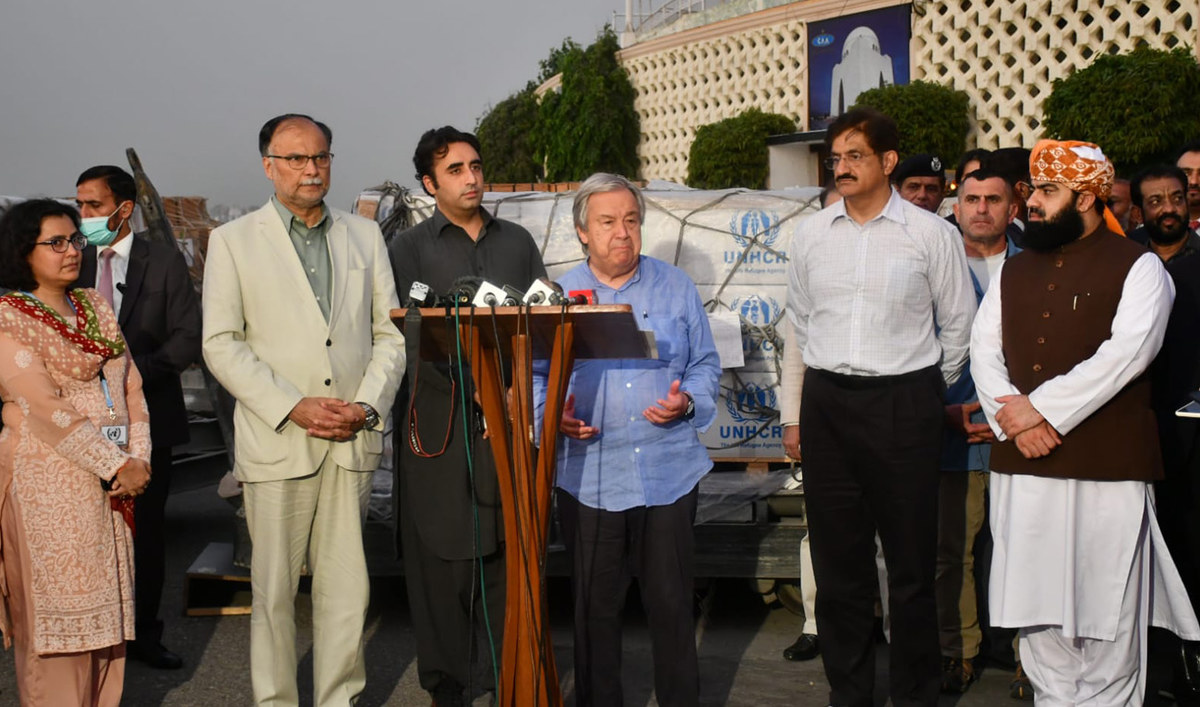SUKKUR: The chief executive of Pakistan’s southern Sindh province urged the world on Sunday to send tents for over 12.5 million people who were rendered homeless by recent floods in areas under his administration’s control while maintaining they were living in harsh conditions.
Massive floods triggered by unprecedented monsoon rains and glacier melt submerged a third of Pakistan while killing over 1,400 people and affecting the lives of 33 million since the month of June.
United Nations Secretary General Antonio Guterres visited the flood-affected regions over the weekend and described the situation as an unimaginable “climate carnage.”
“Due to the magnitude of the devastation and areas affected by floods, more than 12.5 million people have become homeless in Sindh,” Chief Minister Murad Ali Shah told Arab News in an exclusive interview in Sukkur.
“We still have thousands of families who do not have tents and are living under the sky,” he continued. “I would like to appeal to all countries to send us tents on priority so we can at least provide a temporary shelter to the affected families.”
Shah maintained that tents would be needed for a longer duration since a large number of houses had been destroyed in the province and needed to be rebuilt.

United Nations Secretary-General Antonio Guterres (C) speaks to the media during his visit to Pakistan’s flood-hit southern Sindh province on September 10, 2022 with officials from federal and provincial governments. (Twitter/Sindh government)
The chief minister said that people had lost their crops, livestock and businesses which would cost more than Rs350 billion. The estimate, he added, did not include damages to schools, hospitals and other public infrastructure in the province.
Shah said flood water was not receding and could take months to be drained out. He expressed satisfaction at his administration’s coordination with the federal government, though he added that the scale of devastation was so huge that it was beyond the country’s capacity to deal with it.
“The UN secretary general also committed he would do everything to help the people of Sindh and launch a special appeal to the world,” Shah continued. “He said it himself that developed nations were responsible for this climate-induced catastrophe.”
Asked about the rise of waterborne diseases in flood-affected regions, Shah said his administration was aware of the health care issues in the wake of the monsoon rains and was making arrangements to address the problem.
“We have dispersed our stocks of medicines in field hospitals and makeshift medical units,” he explained.
He added the provincial health department was also working with private sector to secure more medicines and provide free treatment to people.
Shah informed that Muslim countries, like the United Arab Emirates and Qatar, had come to his administration’s help by setting up mobile health hospitals in the province.
The Sindh chief minister also mentioned his “two-pronged strategy” to deal with the current disaster.
“First, we have to provide relief and rescue to people by ensuring collective national response with the help of the international community,” he said. “Second, we need to save our people from such calamities in the future by building climate-resilient infrastructure and facilities to deal with natural disasters.”
















